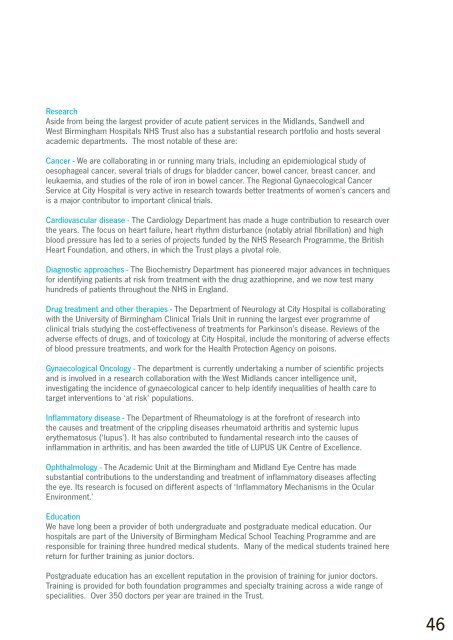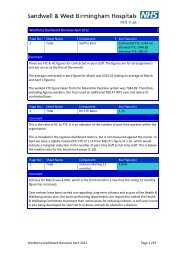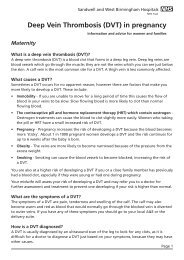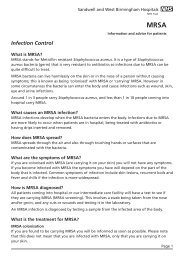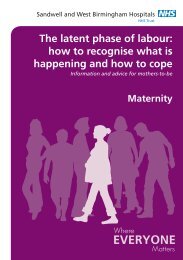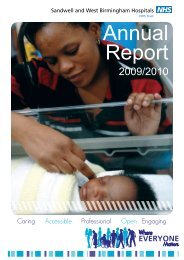Annual Review 2009 - Sandwell & West Birmingham Hospitals
Annual Review 2009 - Sandwell & West Birmingham Hospitals
Annual Review 2009 - Sandwell & West Birmingham Hospitals
You also want an ePaper? Increase the reach of your titles
YUMPU automatically turns print PDFs into web optimized ePapers that Google loves.
Research<br />
Aside from being the largest provider of acute patient services in the Midlands, <strong>Sandwell</strong> and<br />
<strong>West</strong> <strong>Birmingham</strong> <strong>Hospitals</strong> NHS Trust also has a substantial research portfolio and hosts several<br />
academic departments. The most notable of these are:<br />
Cancer - We are collaborating in or running many trials, including an epidemiological study of<br />
oesophageal cancer, several trials of drugs for bladder cancer, bowel cancer, breast cancer, and<br />
leukaemia, and studies of the role of iron in bowel cancer. The Regional Gynaecological Cancer<br />
Service at City Hospital is very active in research towards better treatments of women’s cancers and<br />
is a major contributor to important clinical trials.<br />
Cardiovascular disease - The Cardiology Department has made a huge contribution to research over<br />
the years. The focus on heart failure, heart rhythm disturbance (notably atrial fibrillation) and high<br />
blood pressure has led to a series of projects funded by the NHS Research Programme, the British<br />
Heart Foundation, and others, in which the Trust plays a pivotal role.<br />
Diagnostic approaches - The Biochemistry Department has pioneered major advances in techniques<br />
for identifying patients at risk from treatment with the drug azathioprine, and we now test many<br />
hundreds of patients throughout the NHS in England.<br />
Drug treatment and other therapies - The Department of Neurology at City Hospital is collaborating<br />
with the University of <strong>Birmingham</strong> Clinical Trials Unit in running the largest ever programme of<br />
clinical trials studying the cost-effectiveness of treatments for Parkinson’s disease. <strong>Review</strong>s of the<br />
adverse effects of drugs, and of toxicology at City Hospital, include the monitoring of adverse effects<br />
of blood pressure treatments, and work for the Health Protection Agency on poisons.<br />
Gynaecological Oncology - The department is currently undertaking a number of scientific projects<br />
and is involved in a research collaboration with the <strong>West</strong> Midlands cancer intelligence unit,<br />
investigating the incidence of gynaecological cancer to help identify inequalities of health care to<br />
target interventions to ‘at risk’ populations.<br />
Inflammatory disease - The Department of Rheumatology is at the forefront of research into<br />
the causes and treatment of the crippling diseases rheumatoid arthritis and systemic lupus<br />
erythematosus (‘lupus’). It has also contributed to fundamental research into the causes of<br />
inflammation in arthritis, and has been awarded the title of LUPUS UK Centre of Excellence.<br />
Ophthalmology - The Academic Unit at the <strong>Birmingham</strong> and Midland Eye Centre has made<br />
substantial contributions to the understanding and treatment of inflammatory diseases affecting<br />
the eye. Its research is focused on different aspects of ‘Inflammatory Mechanisms in the Ocular<br />
Environment.’<br />
Education<br />
We have long been a provider of both undergraduate and postgraduate medical education. Our<br />
hospitals are part of the University of <strong>Birmingham</strong> Medical School Teaching Programme and are<br />
responsible for training three hundred medical students. Many of the medical students trained here<br />
return for further training as junior doctors.<br />
Postgraduate education has an excellent reputation in the provision of training for junior doctors.<br />
Training is provided for both foundation programmes and specialty training across a wide range of<br />
specialities. Over 350 doctors per year are trained in the Trust.<br />
46


